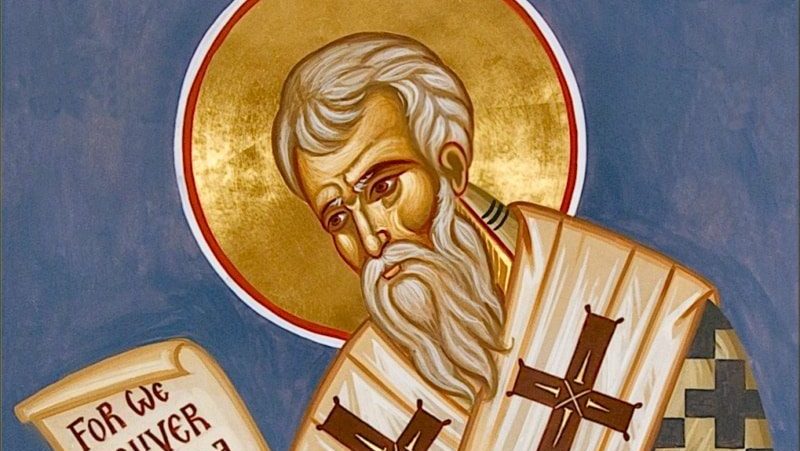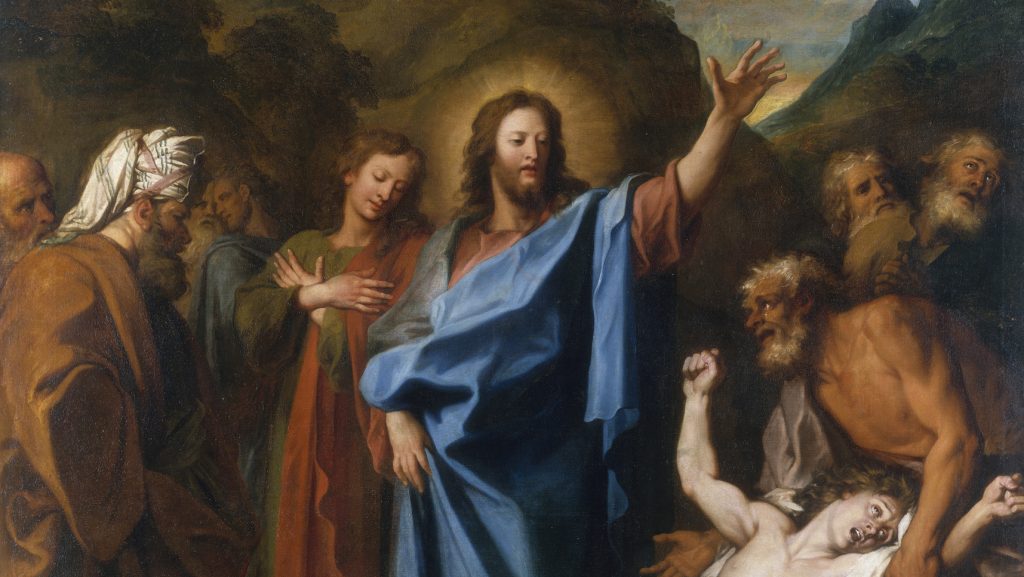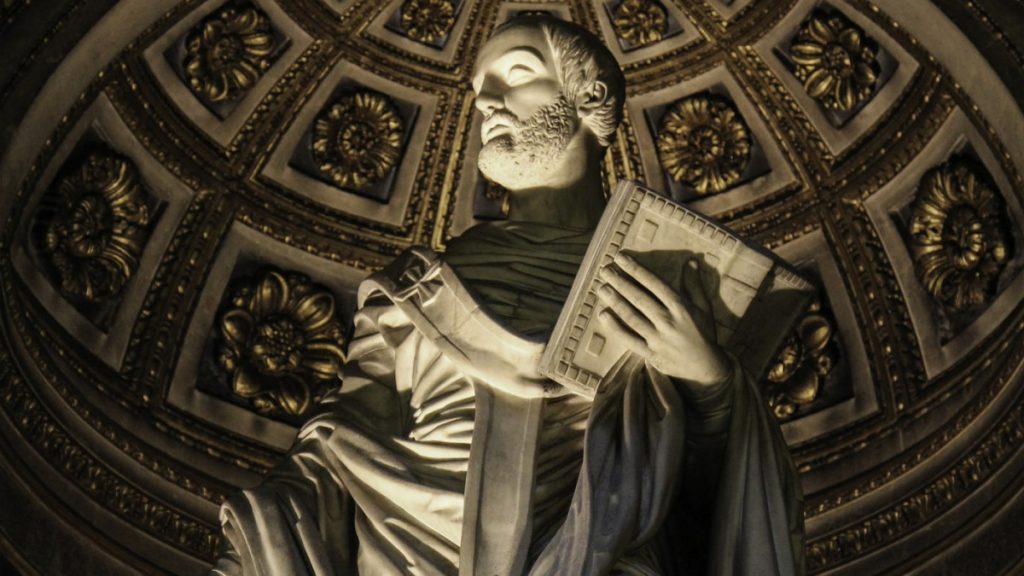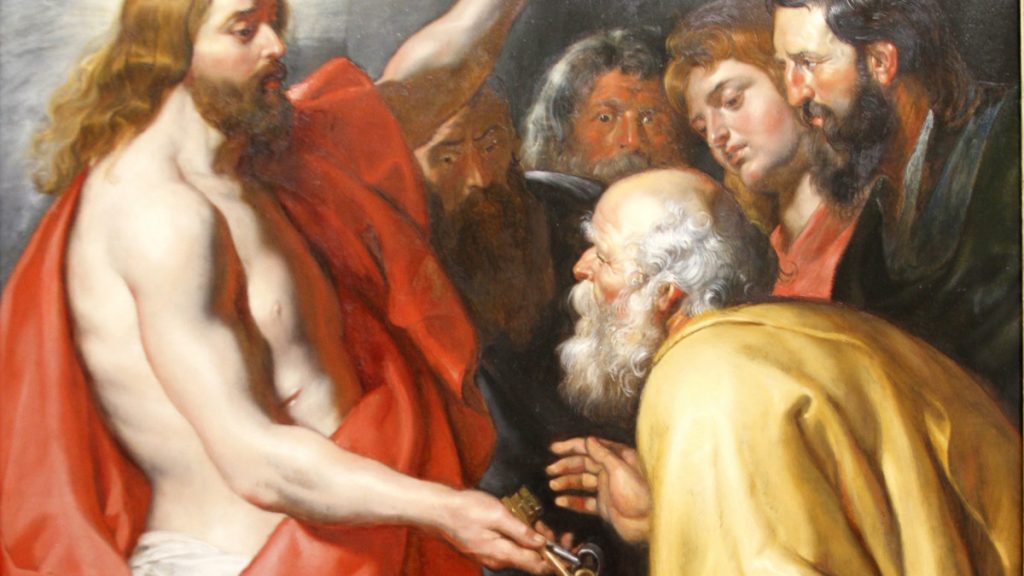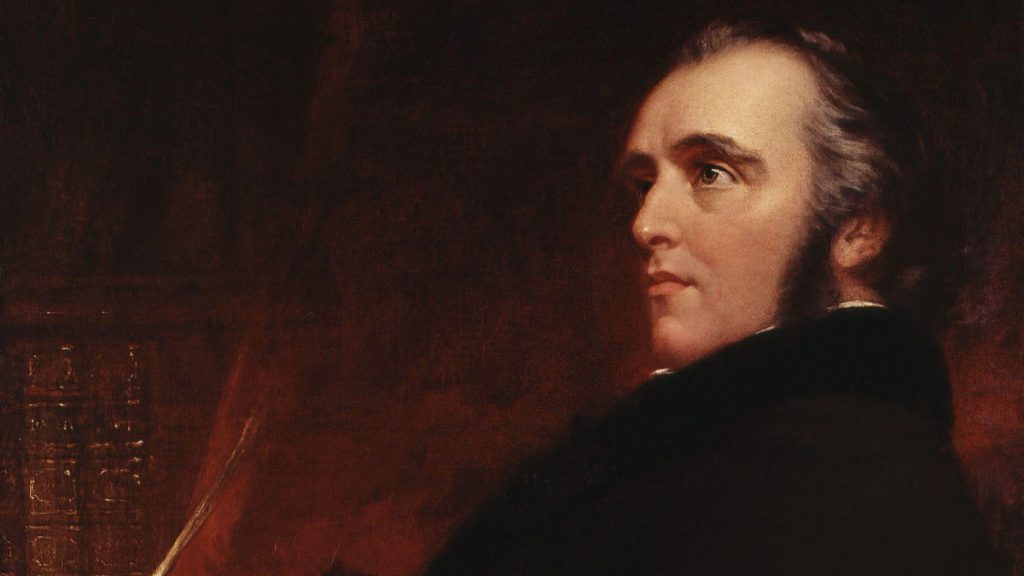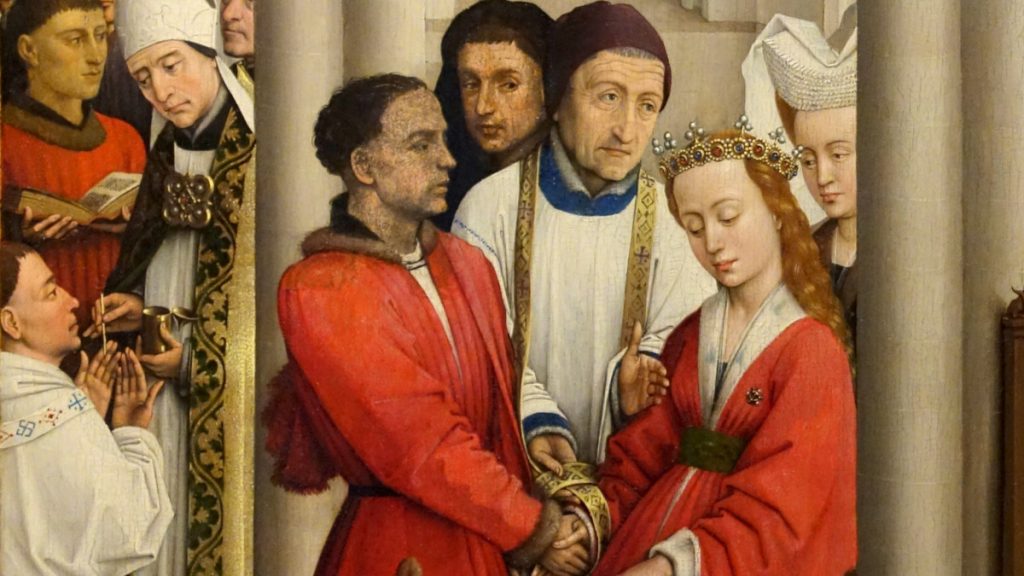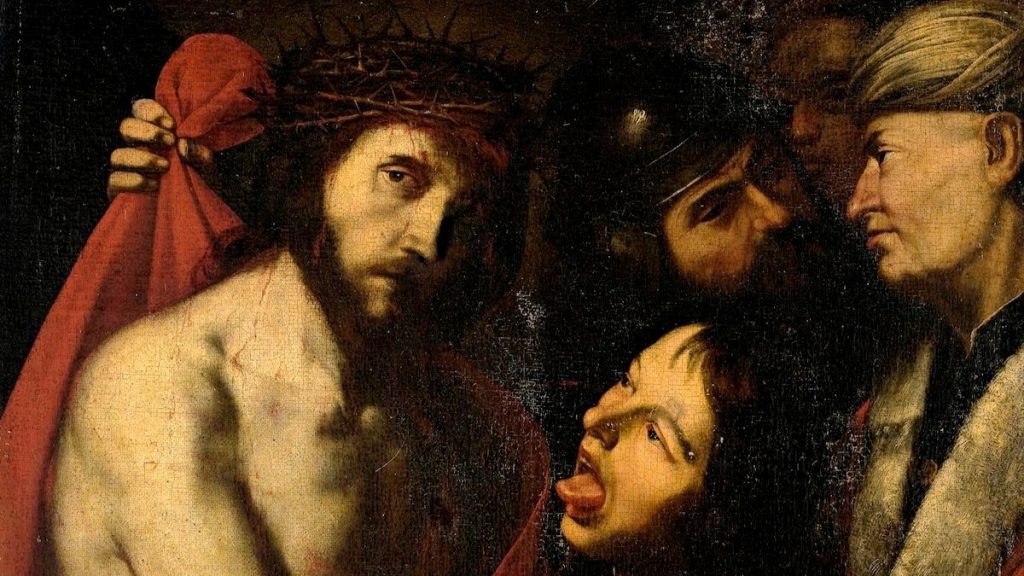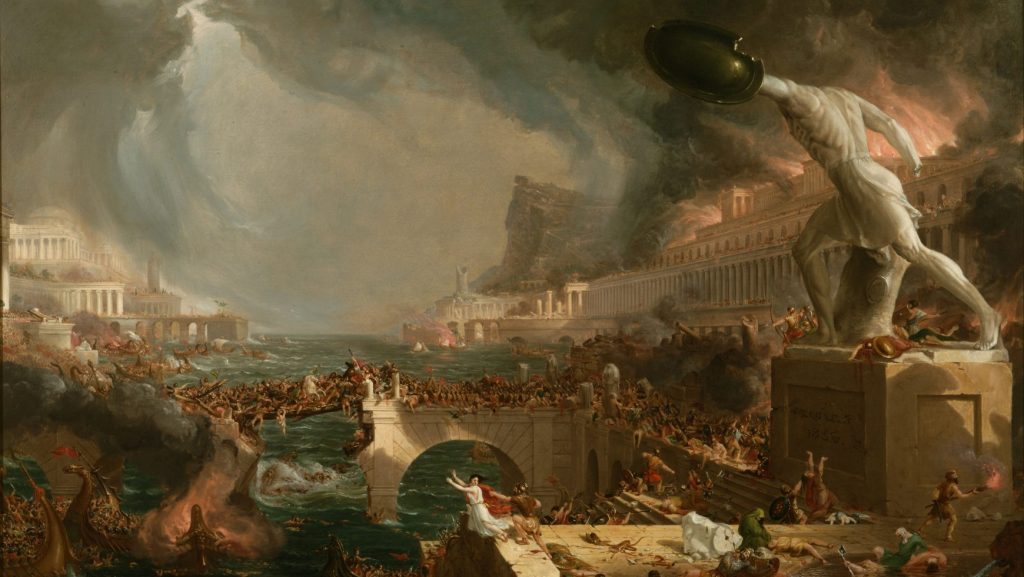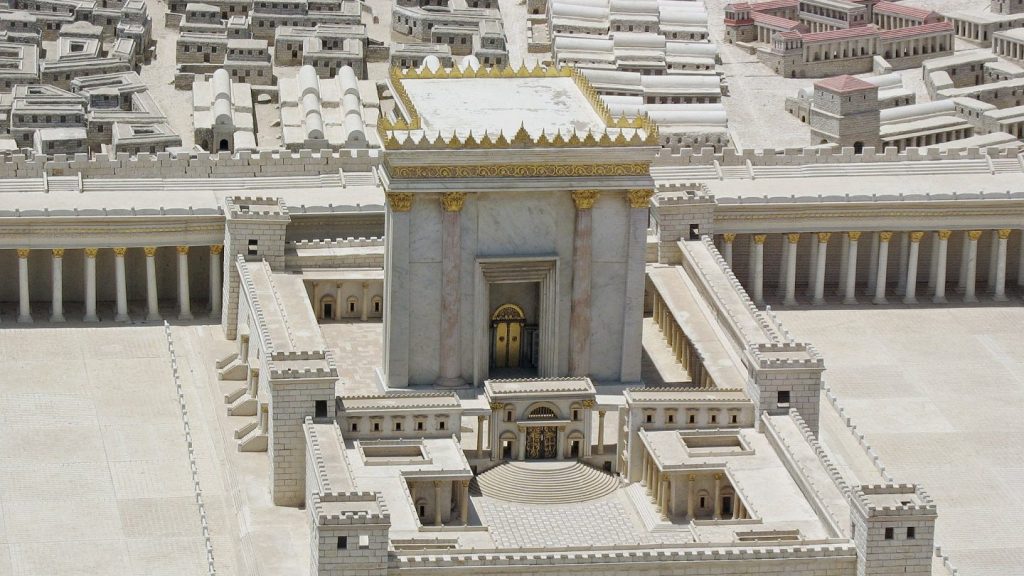(Updated July 16, 2025)
This Author Quote Archive collects pertinent quotes from the Church Father, St. Cyril of Jerusalem.
Next to each quote are the Topic Quote Archives in which they are included.
This Quote Archive is being continuously updated as research continues. Quotes marked with “***” have not yet been organized into their respective Topic Quote Archives.
Catechetical Lectures
St. Cyril of Jerusalem, Catechetical Lecture 18: On the Words “And in one, holy, Catholic Church, and in the Resurrection of the Flesh, and the Life Everlasting” in the Creed (c. 350)
(§1) ***
The root of all good works is the hope of the Resurrection; for the expectation of the recompense nerves the soul to good works. For every laborer is ready to endure the toils, if he sees their reward in prospect; but when men weary themselves for nought, their heart soon sinks as well as their body. A soldier who expects a prize is ready for war, but no one is forward to die for a king who is indifferent about those who serve under him, and bestows no honors on their toils. In like manner every soul believing in a Resurrection is naturally careful of itself; but, disbelieving it, abandons itself to perdition. He who believes that his body shall remain to rise again, is careful of his robe, and defiles it not with fornication; but he who disbelieves the Resurrection, gives himself to fornication, and misuses his own body, as though it were not his own. Faith therefore in the Resurrection of the dead, is a great commandment and doctrine of the Holy Catholic Church; great and most necessary, though gainsaid by many, yet surely warranted by the truth. Greeks contradict it [Acts 17:32; 26:24], Samaritans disbelieve it, heretics mutilate it; the contradiction is manifold, but the truth is uniform.
St. Cyril of Jerusalem, Catechetical Lecture 2: On Repentance and Remission of Sins, and the Adversary (c. 350)
The Lord is loving unto man, and swift to pardon, but slow to punish. Let no man therefore despair of his own salvation. Peter, the chiefest and foremost of the Apostles, denied the Lord thrice before a little maid: but he repented himself, and wept bitterly. Now weeping shows the repentance of the heart: and therefore he not only received forgiveness for his denial, but also held his Apostolic dignity un-forfeited.
St. Cyril of Jerusalem, Catechetical Lecture 3: On Baptism (c. 350)
(§4) …When going down, therefore, into the water, think not of the bare element, but look for salvation by the power of the Holy Ghost: for without both, you cannot possibly be made perfect. It is not I that say this, but the Lord Jesus Christ, who has the power in this matter: for He says, “Unless a man be born anew (and He adds the, words) of water and of the Spirit, he cannot enter into the kingdom of God” (John 3:3). Neither does he that is baptized with water, but not found worthy of the Spirit, receive the grace in perfection; nor if a man be virtuous in his deeds, but receive not the seal by water, shall he enter into the kingdom of heaven. A bold saying, but not mine, for it is Jesus who has declared it: and here is the proof of the statement from Holy Scripture. Cornelius was a just man, who was honored with a vision of Angels, and had set up his prayers and almsdeeds as a good memorial before God in heaven.
(§10) If any man receive not Baptism, he has not salvation; except only Martyrs, who even without the water receive the kingdom. For when the Savior, in redeeming the world by His Cross, was pierced in the side, He shed forth blood and water; that men, living in times of peace, might be baptized in water, and, in times of persecution, in their own blood. For martyrdom also the Savior is wont to call a baptism, saying, “Can you drink the cup which I drink, and be baptized with the baptism that I am baptized with?” (Mark 10:38)…
(§11) Jesus sanctified Baptism by being Himself baptized. If the Son of God was baptized, what godly man is he that despises Baptism? But He was baptized not that He might receive remission of sins, for He was sinless; but being sinless, He was baptized, that He might give to them that are baptized a divine and excellent grace. For since the children are partakers of flesh and blood, He also Himself likewise partook of the same [Heb. 2:14], that having been made partakers of His presence in the flesh we might be made partakers also of His Divine grace: thus Jesus was baptized, that thereby we again by our participation might receive both salvation and honor…
(§12) For you go down into the water, bearing your sins, but the invocation of grace, having sealed your soul, suffers you not afterwards to be swallowed up by the terrible dragon. Having gone down dead in sins, you come up quickened in righteousness. For if you have been united with the likeness of the Savior’s death [Rom. 6:5], you shall also be deemed worthy of His Resurrection. For as Jesus took upon Him the sins of the world, and died, that by putting sin to death He might rise again in righteousness; so thou by going down into the water, and being in a manner buried in the waters, as He was in the rock, art raised again walking in newness of life.
St. Cyril of Jerusalem, Catechetical Lecture 4: On the Ten Points of Doctrine (c. 350)
For the method of godliness consists of these two things, pious doctrines, and virtuous practice: and neither are the doctrines acceptable to God apart from good works, nor does God accept the works which are not perfected with pious doctrines. For what profit is it, to know well the doctrines concerning God, and yet to be a vile fornicator? And again, what profit is it, to be nobly temperate, and an impious blasphemer? A most precious possession therefore is the knowledge of doctrines: also there is need of a wakeful soul, since there are many “that make spoil through philosophy and vain deceit” (Col. 2:8). The Greeks on the one hand draw men away by their smooth tongue, “for honey drops from a harlot’s lips” (Prov. 5:3): whereas they of the Circumcision deceive those who come to them by means of the Divine Scriptures, which they miserably misinterpret though “studying them from childhood to old age” (Isa. 46:3), and growing old in ignorance. But the children of heretics, “by their good words and smooth tongue, deceive the hearts of the innocent” (Rom. 16:17), disguising with the name of Christ as it were with honey the poisoned arrows of their impious doctrines: concerning all of whom together the Lord says, “Take heed lest any man mislead you” (Matt. 24:4). This is the reason for the teaching of the Creed and for expositions upon it.
St. Cyril of Jerusalem, Catechetical Lecture 5: Of Faith (c. 350)
But in learning the Faith and in professing it, acquire and keep that only, which is now delivered to you by the Church, and which has been built up strongly out of all the Scriptures. For since all cannot read the Scriptures, some being hindered as to the knowledge of them by want of learning, and others by a want of leisure, in order that the soul may not perish from ignorance, we comprise the whole doctrine of the Faith in a few lines. This summary I wish you both to commit to memory when I recite it , and to rehearse it with all diligence among yourselves, not writing it out on paper, but engraving it by the memory upon your heart , taking care while you rehearse it that no Catechumen chance to overhear the things which have been delivered to you. I wish you also to keep this as a provision through the whole course of your life, and beside this to receive no other, neither if we ourselves should change and contradict our present teaching, nor if an adverse angel, “transformed into an angel of light” (2 Cor. 11:14) should wish to lead you astray. “For though we or an angel from heaven preach to you any other gospel than that you have received, let him be to you anathema” (Gal. 1:8-9). So for the present listen while I simply say the Creed , and commit it to memory; but at the proper season expect the confirmation out of Holy Scripture of each part of the contents. For the articles of the Faith were not composed as seemed good to men; but the most important points collected out of all the Scripture make up one complete teaching of the Faith. And just as the mustard seed in one small grain contains many branches, so also this Faith has embraced in few words all the knowledge of godliness in the Old and New Testaments. Take heed then, brethren, and hold fast the traditions [2 Thess. 2:15] which you now receive, and “write them on the table of your heart” (Prov. 7:3).
St. Cyril of Jerusalem, Catechetical Lecture 6: Concerning the Unity of God, the Article of the Creed “I Believe in One God,” and Heresies (c. 350)
(§14) The inventor of all heresy was Simon Magus…This man, after he had been cast out by the Apostles, came to Rome…And he so deceived the City of Rome that Claudius set up his statue, and wrote beneath it, in the language of the Romans, “Simoni Deo Sancto,” which being interpreted signifies, “To Simon the Holy God.”
(§15) As the delusion was extending, Peter and Paul, a noble pair, chief rulers of the Church, arrived and set the error right; and when the supposed god Simon wished to shew himself off, they straightway shewed him as a corpse. For Simon [Magus] promised to rise aloft to heaven, and came riding in a demon’s chariot on the air; but the servants of God fell on their knees, and having shewn that agreement of which Jesus spake, that “If two of you shall agree concerning anything that they shall ask, it shall be done unto them” (Matt. 18:19), they launched the weapon of their concord in prayer against Magus, and struck him down to the earth. And marvelous though it was, yet no marvel. For Peter was there, who carries the keys of heaven [Matt. 16:19]: and nothing wonderful, for Paul was there, who was “caught up to the third heaven, and into Paradise, and heard unspeakable words, which it is not lawful far a man to utter” (2 Cor. 12:2, 4). These brought the supposed God down from the sky to earth, thence to be taken down to the regions below the earth. In this man [Simon Magus] first the serpent of wickedness appeared; but when one head had been cut off, the root of wickedness was found again with many heads.
St. Cyril of Jerusalem, Catechetical Lecture 7: On the Father (c. 350)
And that thou mayest learn more exactly that in the Divine Scriptures it is not by any means the natural father only that is called father, hear what Paul says: “For though ye should have ten thousand tutors in Christ, yet have ye not many fathers: for in Christ Jesus I begat you through the Gospel” (1 Cor. 4:15). For Paul was father of the Corinthians, not by having begotten them after the flesh, but by having taught and begotten them again after the Spirit.
St. Cyril of Jerusalem, Catechetical Lecture 10: Concerning the Article of the Creed, “One Lord Jesus Christ” (c. 350)
Many, my beloved, are the true testimonies concerning Christ. The Father bears witness from heaven of His Son: the Holy Ghost bears witness, descending bodily in likeness of a dove: the Archangel Gabriel bears witness, bringing good tidings to Mary: the Virgin Mother of God bears witness; the blessed place of the manger bears witness…
St. Cyril of Jerusalem, Catechetical Lecture 14: On “And rose again from the dead on the third day, and ascended into Heaven and sat on the right hand of the Father” in the Creed (c. 350)
(§15) ***
Matthew who wrote the Gospel wrote it in the Hebrew tongue; and Paul the preacher was a Hebrew of the Hebrews; and the twelve Apostles were all of Hebrew race. Then fifteen Bishops of Jerusalem were appointed in succession from among the Hebrews. What then is your reason for allowing your own accounts, and rejecting ours, though these also are written by Hebrews from among yourselves.
St. Cyril of Jerusalem, Catechetical Lecture 15: Concerning the Article in the Creed, “And Shall Come in Glory to Judge the Quick and the Dead” (c. 350)
*** (§1) We preach not one advent only of Christ, but a second also, far more glorious than the former. For the former gave a view of His patience; but the latter brings with it the crown of a divine kingdom. For all things, for the most part, are twofold in our Lord Jesus Christ: a twofold generation; one, of God, before the ages; and one, of a Virgin, at the close of the ages: His descents twofold; one, the unobserved, “like rain on a fleece” (Ps. 72:6); and a second His open coming, which is to be. In His former advent, He was wrapped in swaddling clothes in the manger; in His second, He “covers Himself with light as with a garment” (Ps. 104:2). In His first coming, “He endured the Cross, despising shame” (Heb. 12:2); in His second, He comes attended by a host of Angels, receiving glory. We rest not then upon His first advent only, but look also for His second. And as at His first coming we said, “Blessed is He that comes in the Name of the Lord” (Matt. 21:9, 23:39), so will we repeat the same at His second coming; that when with Angels we meet our Master, we may worship Him and say, “Blessed is He that comes in the Name of the Lord.” The Savior comes, not to be judged again, but to judge them who judged Him; He who before held His peace when judged [Matt. 26:63], shall remind the transgressors who did those daring deeds at the Cross, and shall say, “These things hast thou done, and I kept silence” (Ps. 50:21). Then, He came because of a divine dispensation, teaching men with persuasion; but this time they will of necessity have Him for their King, even though they wish it not.
(§2) And concerning these two comings, Malachi the Prophet says, “And the Lord whom you seek shall suddenly come to His temple”(Mal. 3:1-3); behold one coming. And again of the second coming he says, “And the Messenger of the covenant whom you delight in. Behold, He comes, saith the Lord Almighty. But who shall abide the day of His coming? Or who shall stand when He appears? Because He comes in like a refiner’s fire, and like fullers’ herb; and He shall sit as a refiner and purifier.” And immediately after the Savior Himself says, “And I will draw near to you in judgment; and I will be a swift witness against the sorcerers, and against the adulteresses, and against those who swear falsely in My Name” (Mal. 3:5), and the rest. For this cause Paul warning us beforehand says, “If any man builds on the foundation gold, and silver, and precious stones, wood, hay, stubble; every man’s work shall be made manifest; for the day shall declare it, because it shall be revealed in fire” (1 Cor. 3:12). Paul also knew these two comings, when writing to Titus and saying, “The grace of God hath appeared which brings salvation unto all men, instructing us that, denying ungodliness and worldly lusts, we should live soberly, and godly, and righteously in this present world; looking for the blessed hope, and appearing of the glory of the great God and our Savior Jesus Christ” (Tit. 2:11). You see how he spoke of a first, for which he gives thanks; and of a second, to which we look forward. Therefore the words also of the Faith which we are announcing were just now delivered thus; that we believe in Him, who also ascended into the heavens, and sat down on the right hand of the Father, and shall come in glory to judge quick and dead; whose kingdom shall have no end.
(§3) Our Lord Jesus Christ, then, comes from heaven; and He comes with glory at the end of this world, in the last day. For of this world there is to be an end, and this created world is to be re-made anew. For since corruption, “and theft, and adultery,” and every sort of sins “have been poured forth over the earth, and blood has been mingled with blood” (Hos. 4:2) in the world, therefore, that this wondrous dwelling-place may not remain filled with iniquity, this world passes away, that the fairer world may be made manifest. And would you receive the proof of this out of the words of Scripture? Listen to Esaias, saying, “And the heaven shall be rolled together as a scroll; and all the stars shall fall, as leaves from a vine, and as leaves fall from a fig-tree” (Isa. 34:4). The Gospel also says, “The sun shall be darkened, and the moon shall not give her light, and the stars shall fall from heaven” (Matt. 24:29). Let us not sorrow, as if we alone died; the stars also shall die; but perhaps rise again. And the Lord rolls up the heavens, not that He may destroy them, but that He may raise them up again more beautiful. Hear David the Prophet saying, “You, Lord, in the beginning did lay the foundations of the earth, and the heavens are the work of Thy hands; they shall perish, but You remain” (Ps. 102:25-26; Heb. 1:10-12). But someone will say, “Behold, he says plainly that ‘they shall perish.’” Hear in what sense he says, “they shall perish”; it is plain from what follows: “And they all shall wax old as does a garment; and as a vesture shall You fold them up, and they shall be changed.” For as a man is said to “perish,” according to that which is written, “Behold, how the righteous perishes, and no man lays it to heart” (Isa. 57:1), and this, though the resurrection is looked for; so we look for a resurrection, as it were, of the heavens also. “The sun shall be turned into darkness, and the moon into blood” (Joel 2:31). Here let converts from the Manichees gain instruction, and no longer make those lights their gods; nor impiously think, that this sun which shall be darkened is Christ. And again hear the Lord saying, “Heaven and earth shall pass away, but My words shall not pass away” (Matt. 24:35); for the creatures are not as precious as the Master’s words.
(§4) The things then which are seen shall pass away, and there shall come the things which are looked for, things fairer than the present; but as to the time let no one be curious. For “it is not for you,” He says, “to know times or seasons, which the Father hath put in His own power” (Acts 1:7). And venture not you to declare when these things shall be, nor on the other hand supinely slumber. For he saith, “Watch, for in such an hour as you expect not the Son of Man comes” (Matt. 24:42, 44). But since it was needful for us to know the signs of the end, and since we are looking for Christ, therefore, that we may not die deceived and be led astray by that false Antichrist, the Apostles, moved by the divine will, address themselves by a providential arrangement to the True Teacher, and say, “Tell us, when shall these things be, and what shall be the sign of Thy coming, and of the end of the world” (Matt. 20:3-4)? We look for Thee to come again, but “Satan transforms himself into an Angel of light”; put us therefore on our guard, that we may not worship another instead of Thee. And He, opening His divine and blessed mouth, says, “Take heed that no man mislead you.” Do you also, my hearers, as seeing Him now with the eyes of your mind, hear Him saying the same things to you: “Take heed that no man mislead you.” And this word exhorts you all to give heed to what is spoken; for it is not a history of things gone by, but a prophecy of things future, and which will surely come. Not that we prophesy, for we are unworthy; but that the things which are written will be set before you, and the signs declared. Observe you, which of them have already come to pass, and which yet remain; and make thyself safe.
(§5) “Take heed that no man mislead you: for many shall come in My name, saying, I am Christ, and shall mislead many.” This has happened in part: for already Simon Magus has said this, and Menander, and some others of the godless leaders of heresy; and others will say it in our days, or after us.
(§6) A second sign. “And ye shall hear of wars and rumors of wars” (Matt. 24:6). Is there then at this time war between Persians and Romans for Mesopotamia, or no? Does nation rise up against nation and kingdom against kingdom, or no? “And there shall be famines and pestilences and earthquakes in divers places.” These things have already come to pass; and again, “And fearful sights from heaven, and mighty storms” (Luke 21:11). “Watch therefore, He says; for you know not at what hour your Lord does come” (Matt. 24:42).
(§7) But we seek our own sign of His coming; we Churchmen seek a sign proper to the Church. And the Savior says, “And then shall many be offended, and shall betray one another, and shall hate one another” (Matt. 24:10). If you hear that bishops advance against bishops, and clergy against clergy, and laity against laity even unto blood, be not troubled; for it has been written before. Heed not the things now happening, but the things which are written; and even though I who teach thee perish, thou shalt not also perish with me; nay, even a hearer may become better than his teacher, and he who came last may be first, since even those about the eleventh hour the Master receives. If among Apostles there was found treason, dost thou wonder that hatred of brethren is found among bishops? But the sign concerns not only rulers, but the people also; for He says, “And because iniquity shall abound, the love of the many shall wax cold” (Matt. 24:12). Will any then among those present boast that he entertains friendship unfeigned towards his neighbor? Do not the lips often kiss, and the countenance smile, and the eyes brighten forsooth, while the heart is planning guile, and the man is plotting mischief with words of peace?
(§8) Thou hast this sign also: “And this Gospel of the kingdom shall be preached in all the world for a witness unto all nations, and then shall the end come” (Matt. 24:14). And as we see, nearly the whole world is now filled with the doctrine of Christ. ***
(§9) And what comes to pass after this? He says next, “When therefore you see the abomination of desolation, which was spoken of by Daniel the Prophet, standing in the Holy Place, let him that reads understand” (Matt. 24:15). And again, “Then if any man shall say unto you, ‘Here, here is the Christ,’ or, ‘Here, there,’ believe it not” (Matt. 24:23). Hatred of the brethren makes room next for Antichrist; for the devil prepares beforehand the divisions among the people, that he who is to come may be acceptable to them. But God forbid that any of Christ’s servants here, or elsewhere, should run over to the enemy!
Writing concerning this matter, the Apostle Paul gave a manifest sign, saying, “For that day shall not come, except there came first the falling away, and the man of sin be revealed, the son of perdition, who opposes and exalts himself against all that is called God, or that is worshiped; so that he sits in the temple of God, showing himself that he is God. Remember you not that when I was yet with you, I told you these things? And now you know that which restrains, to the end that he may be revealed in his own season. For the mystery of iniquity does already work, only there is one that restrains now, until he be taken out of the way. And then shall the lawless one be revealed, whom the Lord Jesus shall slay with the breath of His mouth, and shall destroy with the brightness of His coming. Even him, whose coming is after the working of Satan, with all power and signs and lying wonders, and with all deceit of unrighteousness for them that are perishing” (2 Thess. 2:3-10).
Thus wrote Paul, and now is the falling away. For men have fallen away from the right faith; and some preach the identity of the Son with the Father, and others dare to say that Christ was brought into being out of nothing. And formerly the heretics were manifest; but now the Church is filled with heretics in disguise. For men have fallen away from the truth, and “have itching ears” (2 Tim. 4:3). Is it a plausible discourse? All listen to it gladly. Is it a word of correction? All turn away from it. Most have departed from right words, and rather choose the evil, than desire the good. This therefore is “the falling away,” and the enemy is soon to be looked for: and meanwhile he has in part begun to send forth his own forerunners, that he may then come prepared upon the prey. Look therefore to thyself, O man, and make safe thy soul. The Church now charges thee before the Living God; she declares to thee the things concerning Antichrist before they arrive. Whether they will happen in your time we know not, or whether they will happen after you we know not. But it is well that, knowing these things, you should make thyself secure beforehand.
*** (§10) The true Christ, the Only-begotten Son of God, comes no more from the earth. If any come making false shows in the wilderness, go not forth; if they say, “Lo, here is the Christ, Lo, there, believe it not” (Matt. 24:23). Look no longer downwards and to the earth; for the Lord descends from heaven; not alone as before, but with many, escorted by tens of thousands of Angels; nor secretly as the dew on the fleece [Ps. 72:6]; but shining forth openly as the lightning. For He has said Himself, “As the lightning comes out of the east, and shines even unto the west, so shall also the coming of the Son of Man be” (Matt. 24:27); and again, “And they shall see the Son of Man coming upon the clouds with power and great glory, and He shall send forth His Angels with a great trumpet” (Matt. 24:30); and the rest.
(§11) But as, when formerly He was to take man’s nature, and God was expected to be born of a Virgin, the devil created prejudice against this, by craftily preparing among idol-worshipers fables of false gods, begetting and begotten of women, that, the falsehood having come first, the truth, as he supposed, might be disbelieved; so now, since the true Christ is to come a second time, the adversary, taking occasion by the expectation of the simple, and especially of them of the circumcision, brings in a certain man who is a magician [Antichrist], and most expert in sorceries and enchantments of beguiling craftiness; who shall seize for himself the power of the Roman empire, and shall falsely style himself Christ; by this name of Christ deceiving the Jews, who are looking for the Anointed, and seducing those of the Gentiles by his magical illusions.
(§12) But this aforesaid Antichrist is to come when the times of the Roman empire shall have been fulfilled, and the end of the world is now drawing near. There shall rise up together ten kings of the Romans, reigning in different parts perhaps, but all about the same time; and after these an eleventh, the Antichrist, who by his magical craft shall seize upon the Roman power; and of the kings who reigned before him, “three he shall humble,” and the remaining seven he shall keep in subjection to himself. At first indeed he will put on a show of mildness (as though he were a learned and discreet person), and of soberness and benevolence: and by the lying signs and wonders of his magical deceit having beguiled the Jews, as though he were the expected Christ, he shall afterwards be characterized by all kinds of crimes of inhumanity and lawlessness, so as to outdo all unrighteous and ungodly men who have gone before him; displaying against all men, but especially against us Christians, a spirit murderous and most cruel, merciless and crafty. And after perpetrating such things for three years and six months only, he shall be destroyed by the glorious second advent from heaven of the only-begotten Son of God, our Lord and Savior Jesus, the true Christ, who shall slay Antichrist “with the breath of His mouth,” and shall deliver him over to the fire of hell… ***
(§15) And again he says, “Who opposes and exalts himself against all that is called God, or that is worshiped; (against every God; Antichrist forsooth will abhor the idols) so that he seats himself in the temple of God” (2 Thess. 2:). What temple then? He means, the Temple of the Jews which has been destroyed. For God forbid that it should be the one in which we are! Why say we this? That we may not be supposed to favor ourselves. For if he comes to the Jews as Christ, and desires to be worshiped by the Jews, he will make great account of the Temple, that he may more completely beguile them; making it supposed that he is the man of the race of David, who shall build up the Temple which was erected by Solomon. And Antichrist will come at the time when there shall not be left one stone upon another in the Temple of the Jews, according to the doom pronounced by our Savior [Matt. 24:2; Mark 13:2; Luke 19:44, 21:6]; for when, either decay of time, or demolition ensuing on pretense of new buildings, or from any other causes, shall have overthrown all the stones, I mean not merely of the outer circuit, but of the inner shrine also, where the Cherubim were, then shall he come “with all signs and lying wonders,” exalting himself against all idols; at first indeed making a pretense of benevolence, but afterwards displaying his relentless temper, and that chiefly against the Saints of God. For he says, “I beheld, and the same horn made war with the saints” (Dan. 7:21); and again elsewhere, “there shall be a time of trouble, such as never was since there was a nation upon earth, even to that same time” (Dan. 12:1). Dreadful is that beast, a mighty dragon, unconquerable by man, ready to devour; concerning whom though we have more things to speak out of the divine Scriptures, yet we will content ourselves at present with thus much, in order to keep within compass.
St. Cyril of Jerusalem, Catechetical Lecture 17: Continuation on the Holy Spirit (c. 350)
In the power of the same Holy Spirit Peter also, the chief of the Apostles and the bearer of the keys of the kingdom of heaven, healed Aeneas the paralytic in the Name of Christ at Lydda, which is now Diospolis, and at Joppa raised from the dead Tabitha rich in good works…
St. Cyril of Jerusalem, Catechetical Lecture 19: First Lecture on the Mysteries (c. 350)
Moreover, the things which are hung up at idol festivals, either meat or bread, or other such things polluted by the invocation of the unclean spirits, are reckoned in the pomp of the devil. For as the Bread and Wine of the Eucharist before the invocation of the Holy and Adorable Trinity were simple bread and wine, while after the invocation the Bread becomes the Body of Christ, and the Wine the Blood of Christ, so in like manner such meats belonging to the pomp of Satan, though in their own nature simple, become profane by the invocation of the evil spirit.
St. Cyril of Jerusalem, Catechetical Lecture 21: On Chrism (c. 350)
(§1) …And to you in like manner, after you had come up from the pool of the sacred streams, there was given an Unction, the anti-type of that wherewith Christ was anointed; and this is the Holy Ghost; of whom also the blessed Esaias, in his prophecy respecting Him, said in the person of the Lord, “The Spirit of the Lord is upon Me, because He has anointed Me: He has sent Me to preach glad tidings to the poor” (Isa. 61:1)…
(§3) But beware of supposing this to be plain ointment. For as the Bread of the Eucharist, after the invocation of the Holy Ghost, is mere bread no longer, but the Body of Christ, so also this holy ointment is no more simple ointment, nor (so to say) common, after invocation, but it is Christ’s gift of grace, and, by the advent of the Holy Ghost, is made fit to impart His Divine Nature. Which ointment is symbolically applied to your forehead and your other senses; and while your body is anointed with the visible ointment, your soul is sanctified by the Holy and life-giving Spirit.
(§4) …For as Christ after His Baptism, and the visitation of the Holy Ghost, went forth and vanquished the adversary, so likewise ye, after Holy Baptism and the Mystical Chrism, having put on the whole armor of the Holy Ghost, are to stand against the power of the adversary, and vanquish it, saying, “I can do all things through Christ which strengthens me” (Phil. 4:13).
St. Cyril of Jerusalem, Catechetical Lecture 22: On the Body and Blood of Christ (c. 350)
(§6) Consider therefore the bread and the wine not as bare elements, for they are, according to the Lord’s declaration, the body and blood of Christ; for even though sense suggests this to you, let faith establish you. Judge not the matter from the taste, but from faith be fully assured without misgiving, that the body and blood of Christ have been vouchsafed to you…
(§7) …[David says] “You have anointed my head with oil” (Ps. 23:5). With oil He anointed your head upon your forehead, for the seal which you have of God; that you may be made “the engraving of the signet, Holiness unto God.”
(§9) Having learned these things, and been fully assured that the seeming bread is not bread, though sensible to taste, but the body of Christ; and that the seeming wine is not wine, though the taste will have it so, but the blood of Christ; and that of this David sung of old, saying, “And bread strengthens man’s heart, to make his face to shine with oil, strengthen your heart” (Ps. 104:15), by partaking of it as spiritual, and “make the face of your soul to shine” (Ps. 31:16).
St. Cyril of Jerusalem, Catechetical Lecture No. 23: On the Sacred Liturgy and Communion (c. 350)
- Purgatory | §9
- The Communion of Saints: Intercession and Relics | §9
- The Blessed Sacrament of the Holy Eucharist | §§7-8
(§7) Then having sanctified ourselves by these spiritual Hymns, we beseech the merciful God to send forth His Holy Spirit upon the gifts lying before Him; that He may make the Bread the Body of Christ, and the Wine the Blood of Christ; for whatsoever the Holy Ghost has touched, is surely sanctified and changed.
(§8) Then, after the spiritual sacrifice, the bloodless service, is completed, over that sacrifice of propitiation we entreat God for the common peace of the Churches, for the welfare of the world; for kings; for soldiers and allies; for the sick; for the afflicted; and, in a word, for all who stand in need of succor we all pray and offer this sacrifice.
(§9) Then [during the Eucharistic prayer] we commemorate also those who have fallen asleep before us, first Patriarchs, Prophets, Apostles, Martyrs, that at their prayers and intercessions God would receive our petition. Then on behalf also of the Holy Fathers and Bishops who have fallen asleep before us, and in a word of all who in past years have fallen asleep among us, believing that it will be a very great benefit to the souls, for whom the supplication is put up, while that holy and most awful sacrifice is set forth.
*** (§23) Hold fast these traditions undefiled and, keep yourselves free from offense. Sever not yourselves from the Communion; deprive not yourselves, through the pollution of sins, of these Holy and Spiritual Mysteries. “And the God of peace sanctify you wholly; and may your spirit, and soul, and body be preserved entire without blame at the coming of our Lord Jesus Christ” (1 Thess. 5:23). To whom be glory and honor and might, with the Father and the Holy Spirit, now and ever, and world without end. Amen. ***
